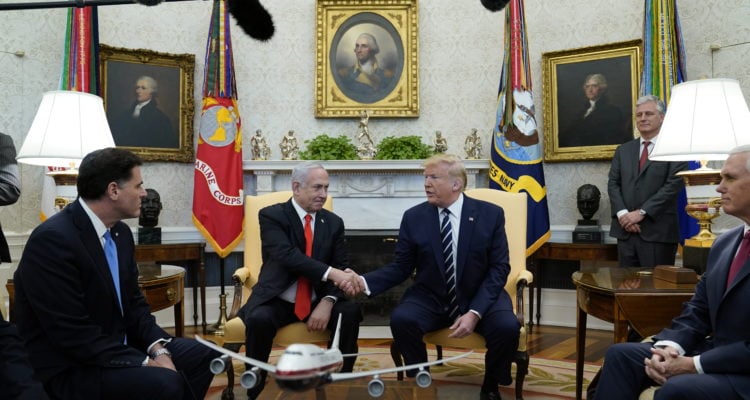Hours before the ceremony in Washington, the Israeli premier announced that he was withdrawing his request for immunity. In doing so, he outmaneuvered his opponents.
By Ruthie Blum, JNS
Justifiably emboldened by his warm reception at the White House — and by the imminent unveiling of U.S. President Donald Trump’s 80-page “deal of the century”— Israeli Prime Minister Benjamin Netanyahu threw a curve ball at his rivals back home.
Key among these was Blue and White Party leader Benny Gantz, who had flown to Washington separately from his nemesis to meet with Trump so as not to come off as an irrelevant tag-along on the trip.
Gantz claimed that he was going to have to miss the big reveal on Tuesday afternoon because of the urgent need to be in Israel that very day to participate in the Knesset proceedings surrounding Netanyahu’s request for temporary immunity from prosecution in three corruption cases.
But he and the other legislators who have been trying to defeat Netanyahu in court, rather than at the ballot box — the same figures who are attributing the timing of Trump’s declaration to an attempt on his part to influence Israel’s March 2 Knesset elections in Netanyahu’s favor — were suddenly outmaneuvered.
On Tuesday morning Israel time, several hours before the ceremony at which Trump was scheduled to present the plan in its entirety, including a map of the borders of the proposed demilitarized Palestinian state, Netanyahu announced that he was withdrawing his request for immunity. Addressing the “citizens of Israel” in a post on Facebook, Netanyahu explained why he was making this move.
“ … [W]hile I am in the U.S. on a historical mission to determine Israel’s permanent borders and guarantee our security for the next generations, another performance of the [immunity] circus is supposed to be held by the Knesset,” he wrote.
“This is part of the obsessive personal persecution of me by the ‘anybody but Bibi’ people. Instead of … rising above political considerations, they continue to engage in cheap politics that impair this critical moment in the country’s history. Since I was not treated to a fair process, since all Knesset procedures have been grossly trampled on, and since the results of the process were pre-determined … I have decided not to let this dirty game go on.”
“A few minutes ago, I informed Knesset Speaker [Yuli Edelstein] that I am withdrawing my request for immunity. Later on, I will shatter all the wild claims and false charges against me. But now, I will not allow my political rivals to use this issue to interfere with the historical move that I am leading …”
Dispelling two myths
It’s not yet clear whether Netanyahu will be able to implement any aspects of Trump’s plan before the Israeli election, which is only four-and-a-half weeks away. But two myths about the “deal of the century” need to be dispelled while the Knesset’s cards are being shuffled.
The first is that Trump’s timing constitutes “interference” in the election. If polls are to be trusted, the political stalemate that is forcing Israelis to return to the ballot box for a third time in less than a year still stands. Netanyahu’s ability to form a coalition will not be affected by the “deal of the century” any more than Trump’s chances for re-election in November will be increased.
The second is that the deal has little significance since neither the Palestinians nor right-wing Israelis will accept it — the former because it is favorable to Israel, and the latter due to its recognition of Palestinian statehood.
In fact, Trump’s plan is a monumental game-changer by its very nature. Indeed, it is a reversal of the “land for peace” formula that has failed over and over again. It also denies the constant false comparison between Israel’s rights and behavior to those of the Arabs who used to be occupied by Jordan, and assert their separateness as a “nation” by virtue of Israel’s having defeated Jordan, Egypt and Syria in the 1967 Six-Day War.
While acknowledging that the Palestinians have become a separate hostile entity since then — one that won’t go away or renounce terrorism — the Trump plan aims to call their bluff by offering them some degree of autonomy, as well as lots of money with which to help create a prosperous mini-state. Meanwhile, the plan gives Israel the right to extend sovereignty over most of its historical homeland.
That Palestinian Authority head Mahmoud Abbas has responded by refusing to accept a phone call from Trump, to whom he referred as a “dog and son of a dog” during a meeting of the Fatah Revolutionary Council, was expected.
Abbas has rejected all overtures, including those made by left-wing peace fantasists in the administration of former U.S. President Barack Obama and former Israeli Prime Minister Ehud Olmert.
Nor are Abbas’s calls for violence in the streets, entreaty for unity with Hamas and Islamic Jihad terrorists against the deal and appeal to Arab leaders allied with America not to be swayed by Trump the least bit surprising.
But Trump doesn’t care, which represents another paradigm shift in Washington’s attitude towards the Palestinian leadership.
“Without them, we don’t do the deal,” he said. “And that’s OK … life goes on.”
The same expression can be applied to Netanyahu. As the Israeli media spent days discussing his “playing up” of the significance of Trump’s plan as a “ploy” to deflect from the Knesset debate on his immunity request, he undermined their argument in one fell swoop and went on, in his words, “to make history.”
Ruthie Blum is an Israel-based journalist and author of “To Hell in a Handbasket: Carter, Obama, and the ‘Arab Spring.’”





